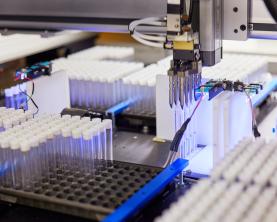Leading Tomorrow's Research
At Texas Children’s, we are driven to make a difference in the lives of children. Our research expertise has resulted in breakthrough developments for a variety of pediatric health conditions. With more than 800 clinic trials currently ongoing, we are working to solve many others. Finding the right diagnosis for one child can help countless more.

Breakthroughs are in our DNA
Together with our partner, Baylor College of Medicine, our research efforts push the boundaries of treatment protocols and potential cures for pediatric health conditions toward a better future for children.
$179M+ In annual external research funding
85 New disease genes discovered
800K+ Square feet of laboratory space
431 Active Clinical Trials

State-of-the-art Research Centers The Jan and Dan Duncan Neurological Research Institute
Duncan NRI is dedicated to solving pediatric and adult brain disorders and injuries. Home to more than 25 principal investigators and 200 scientists focused on leading-edge research, Duncan NRI’s discoveries in neuroscience could lead to therapies for many incurable conditions.

Our Research

Areas of Research

Find a Lab

Find a Clinical Trial
Collaborative Research Partnerships
Researchers and physicians at Texas Children's Hospital are engaged in many national collaborative research partnerships. A few prominent ones are The Undiagnosed Diseases Network and The Southwest Pediatric Device Consortium.
Research News




